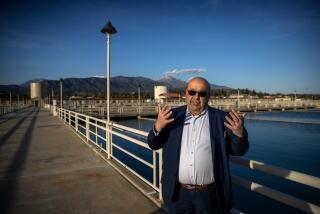Alyeska Spyjinks Probe Has a Surprising Ending : Energy: Investigators didn’t question the industrialist who was the main target of the corporate espionage.
- Share via
WASHINGTON — The last day of hearings into Alyeska Pipeline Service Co.’s covert spyjinks against whistle-blowers ended abruptly when the House Interior Committee opted not to question the Virginia oil tanker broker who was the main target of Alyeska’s probe.
The committee’s chairman, Rep. George Miller (D-Martinez), said committee members decided not to question industry gadfly Charles Hamel because the panel’s focus was on the details of the secret probe conducted by Florida-based Wackenhut Corp. at Alyeska’s behest.
“Mr. Hamel had no control or operational say-so in the surveillance . . . and the focus of this hearing had to be on those individuals that were making decisions about whether or not to go forward or not go forward with the surveillance,” Miller said after the hearings ended.
But an Alyeska spokeswoman said the decision not to query the outspoken industry critic left questions unanswered, including some about Hamel’s relationship with the committee.
“Many of them needed to be answered essentially by Mr. Hamel, questions regarding the treatment of attorney-client privileged documents . . . whether they were stolen or not, did he give them to the committee,” said Marnie Isaacs, a spokeswoman for the consortium of seven major oil companies that owns and operates the 800-mile trans-Alaska pipeline.
It was a surprise ending to hearings into an involved case of corporate espionage--a probe aimed at Hamel and other Alyeska critics and possibly involving violations of federal and state criminal laws.
During the hearings, questions had arisen about whether Hamel had been funneling stolen or privileged Alyeska documents to the committee, its staff or Miller.
Under Miller’s leadership, the panel has aggressively investigated environmental practices of the oil companies and the committee has held several hearings into the massive 1989 oil spill from the tanker Exxon Valdez in Alaska.
“Companies were concerned about information that was coming into the committee, and I think the concern is legitimate, and we ought to take every effort to see that, when that concern is there, we have a process that answers it,” said Rep. Charles H. Taylor (R-N.C.). “Clearly, this committee is not a repository for stolen or illegal information.”
Asked whether the committee had received stolen documents, Miller replied, “Not to my knowledge.”
Alyeska has argued that its probe was aimed at identifying the source of stolen documents, including privileged attorney-client documents. But Hamel said in an interview after testifying Wednesday that the information he was given pertained to environmental wrongdoing by Alyeska.
“I didn’t steal any documents,” he said. “I didn’t possess any stolen documents. I possessed information, and it was passed on to me by sources who wanted to get this information to the government, and that’s all I was . . . a conduit.”
More to Read
Get the L.A. Times Politics newsletter
Deeply reported insights into legislation, politics and policy from Sacramento, Washington and beyond. In your inbox twice per week.
You may occasionally receive promotional content from the Los Angeles Times.










